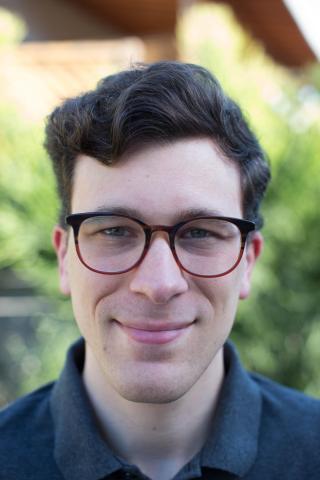Get to know ECE alumnus, Jean-Pierre de la Croix, Robotics Systems Engineer at NASA’s Jet Propulsion Laboratory (JPL).
Name: Jean-Pierre de la Croix
Georgia Tech Degrees: B.S. Electrical Engineering and Computer Science, Ph.D. in Electrical Engineering
Year Degrees Awarded: 2010, 2015
Current Title/Position: Robotics Systems Engineer
Current Company/Organization: NASA’s Jet Propulsion Laboratory (JPL)
Describe your average workday: I lead a number of multi-robot autonomy projects (from autonomous surface vessels to SmallSats to small, foldable Mars rovers called PUFFERs), so most of my day is spent coordinating the technical activities of these projects. I also get my own hands dirty in these activities and try to save some time in the day to think about new ways we can explore our universe with swarms of robots!
What do you enjoy most about your job? It’s a never-ending learning experience. JPL works on a very diverse set of projects to explore and understand our universe; each staffed with experts in many different technical areas. For example, I contributed to a project studying whether we can send a robot through the vents on Enceladus to reach the sub-surface ocean. Consequently, I learned from scientists about cryovolcanism to understand the most likely vent geometry and conditions that a robot would have to navigate and survive.
How did ECE prepare you for your current role? ECE courses teach theoretical principles and their application in equal parts, which are key to becoming a successful engineer. In addition, the Ph.D. program was instrumental in developing my ability to use creativity to identify and create entirely new solutions to challenging problems.
What advice would you give current ECE students? If you are at all interested in graduate school, get involved with research as an undergraduate. Also, pursue your interests outside of the classroom. For example, if it’s robotics, the RoboJackets give you the opportunity to work on robots for competitions. As a bonus, it gives you an edge when applying for internships, graduate school, or jobs.
What do you think is the most important technological breakthrough of the past 20 years? I believe it is the technologies that have allowed us to capture, process, and reason over very large sets of data, because they’ve led to breakthroughs with many other technologies. Examples include self-driving (autonomous) cars and grocery stores without checkout lines!
When you aren’t working, what do you like to do? I enjoy exploring all the things that Southern California has to offer with my wife, going for early morning runs, or relaxing with some video games. My wife is also teaching me her photography skills, which I hope to use for astrophotography soon!
Is there anything else you would like to add? Another piece of advice: interests change over time, so don’t be afraid to change what you do too. I spent my first two years at Georgia Tech as a mechanical engineer, because I was interested in building robots. I switched majors, because I gravitated towards designing and implementing the algorithms for autonomous robots.
